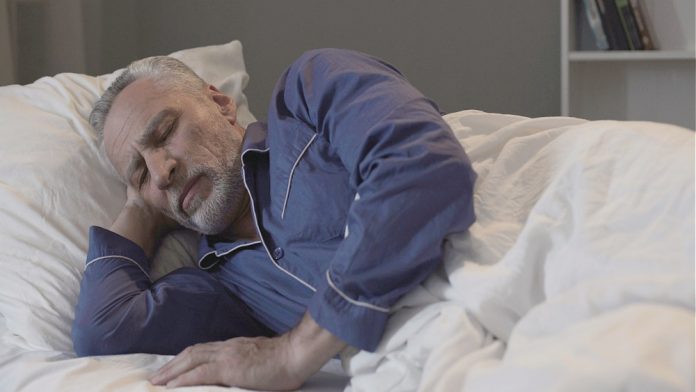Aging and sleep difficulties are often linked, but that doesn’t mean you have to continue to suffer. Insomnia in older adults may be easily treated with a series of lifestyle changes and the support of medication. If you’re wondering what the best treatment for insomnia in older adults is, you’ve come to the right place.
Read on for more information on what causes insomnia in seniors and what to do for insomnia, including six solutions for how to cure insomnia
Why Do Seniors Have Trouble Sleeping?
Before diving into potential solutions for insomnia, it is important to understand why seniors struggle to have a good night’s sleep in the first place.
Changes In Sleep Quality
Sleep quality is prone to decline with age. Put simply, this is because older people tend to sleep less and wake more during the night. It can also take older adults a longer amount of time to fall asleep (a.k.a. increased sleep latency).
Studies have also shown that, when compared to younger counterparts, older adults have a lower rate of restful sleep. This means that while sleep quantity (the number of hours slept) may remain the same, there could be a decrease in the quality of sleep as you age.
Changes In Sleep Quantity
With age, the amount of sleep you get can also change. There is often a decrease in sleep duration because the body’s system for internal timekeeping begins to decline.
In other words, as you age the body’s clock gets worse at keeping time. You’ve probably already heard of circadian rhythms or signals, which are integral in helping you go to bed and wake up around the time each day. The body becomes less efficient at processing these circadian signals with age.
Symptoms of Poor Sleep
It can be difficult to find clear signs of insomnia since fatigue and tiredness are often symptoms included with many other disorders. However, the following symptoms may be helpful signs in identifying insomnia:
- Daytime impairments (i.e. trouble concentrating or paying attention)
- Excessive daytime sleepiness
- Feelings of fatigue
- Mood disturbances (i.e. irritability)
- Muscle soreness (malaise)
- Needing a caregiver to intervene in your sleep schedule
- Resistance when it comes to going to bed at a reasonable hour
- Trouble falling asleep or staying asleep
- Waking up earlier than desired (repeatedly)
Clinical insomnia (insomnia diagnosed by a doctor) is classified as experiencing symptoms at least three times a week for at least three months. Anything outside of this time frame is considered short-term insomnia.
Risks Associated With Insomnia
It may seem like everyone struggles to get enough sleep, but that is not true. “Trouble sleeping” may be a common sentiment but is certainly not normal. It is important to understand the risks associated with lack of sleep.
Along with experiencing the symptoms mentioned above, insomnia can increase the risk of:
- Accidents
- Situational struggles (i.e. social disconnect or arguments with family members)
How to Treat Insomnia in Seniors
Here are six solutions to try for insomnia in older adults, including balancing your diet and improving sleep hygiene.
1. Balance Your Diet
Did you know insomnia can cause cravings and that hypersomnia can cause lack of appetite? Sleep and diet can have an effect on one another, making a balanced plate important for reasons beyond just nutrition.
Conditions like diabetes can further impact blood sugar levels, so it is crucial if you are elderly to be paying careful attention to what you eat.
2. Discover If It’s Primary or Secondary Insomnia
There are actually two types of insomnia. Primary insomnia means the symptoms occur independently, while secondary insomnia happens due to another medical or psychiatric condition.
Although the symptoms may be similar, with secondary insomnia treating the root cause may help cure insomnia itself.
3. Invest in Sleep Hygiene
Sleep hygiene is essentially a term that means “cleaning up” your bedroom routine. It refers to maintaining a bedroom environment conducive to a good night’s sleep.
For example, you could invest in practices or devices that ensure the room stays dark, quiet, and at a temperature suited to healthy sleep. Blackout curtains can help a lot to maintain a routine bedtime despite changing seasons.
4. Don’t Count Medicine Out
For short-term or long-term insomnia, sleep medicine and sleep aids may be recommended. Be sure to use medications as instructed by your doctor.
It’s important to note that sleep medication isn’t designed as a long-term solution. Instead, it should be used to accompany regular exercise, balanced meals, and other healthy habits.
5. Try Therapy to Improve Sleep Habits
Sleep disturbances may be more deep-rooted than just having trouble sleeping. A popular kind of therapy called cognitive behavioral therapy (CBT) can help you identify limiting beliefs and deep-seated beliefs that are keeping you from fully experiencing restful sleep. Therapy may also help you get more restful sleep after a trauma has occurred in your life.
Additional methods, like bright light therapy (using timed exposure to bring lights as a trigger for staying awake), may also be suggested by healthcare professionals for your situation.
6. Keep a Sleep Diary
Keeping a sleep diary can help you identify behaviors and activities that are interfering with sleep. For example, tracking how much caffeine you consume can help you find a “sweet spot” that doesn’t affect your sleep.
In Summary On Insomnia
There is no one “right” or “perfect” treatment for acute or chronic insomnia. Rather, a series of small yet significant lifestyle changes can be made to encourage a better night’s sleep. Trouble sleeping may be common but it is not normal, and you deserve a quality night’s sleep as you age!
References:
Fry A. Insomnia and Older Adults. Sleep Foundation. Published April 2022. https://www.sleepfoundation.org/insomnia/older-adults.
Spinola J. Diabetes in the Elderly. The Geriatric Dietitian. Published August 2020. https://thegeriatricdietitian.com/diabetes-in-the-elderly/.






